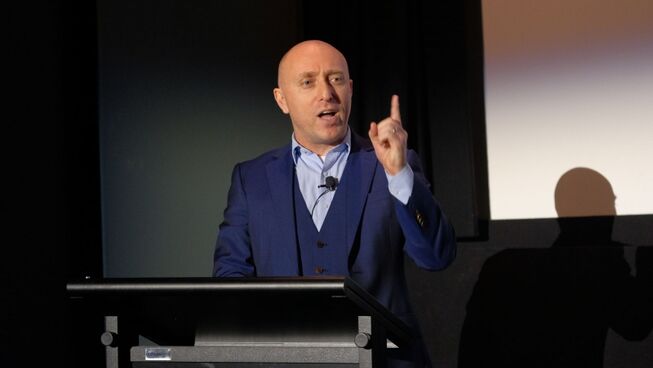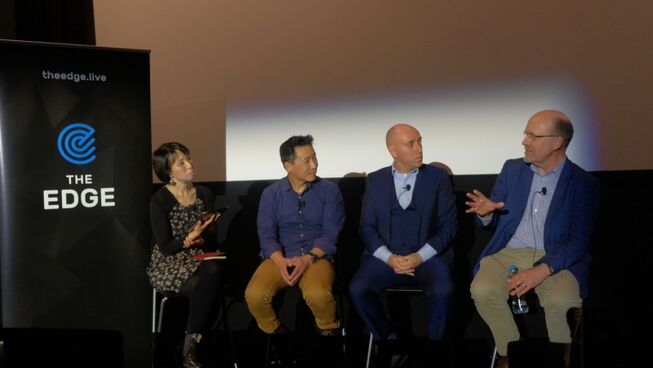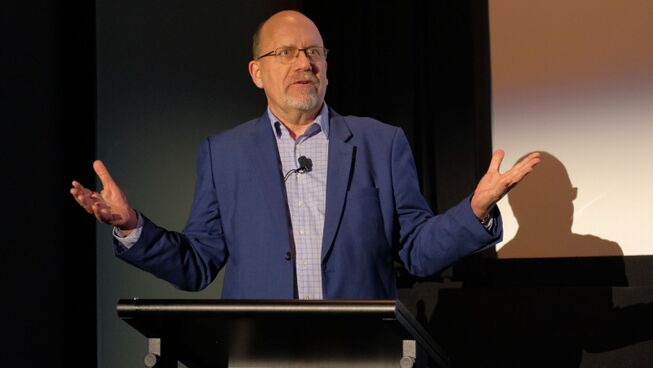Who can you trust in a fake news world?

The ten scariest words you hear in life are: “What do you want to do when you grow up?”
When I was a six-year-old kid in Lithgow, I wanted to be the pilot of the Millennium Falcon. Little did I know, but that was a fake job! Later, you start to ask that question seriously, because everyone else is. The answer came to me in Year 10 – I wanted to be a journalist.
I went to university, where we were told journalism is the foundation of democracy. Truth is vital to our industry. We would hear stories about journalists fighting for truth. I went into journalism expecting to punch through corruption to expose the wickedness of the world. And what happened? I end up writing a story about seals in a movie ... fake seals!
I came to realise two things about journalism: you can grow bald very quickly, and you can become cynical about your job!
The height of my cynicism came in 1999, when the South Sydney Rabbitohs were kicked out of the NRL. Thousands marched in Sydney – stopping traffic. Yet, News Limited papers buried the story away. Why? Because News had a huge stake in the NRL and wanted to kick Souths out.
All newspapers have agendas – and increasingly so worldwide.
There’s a lot of talk about fake news, especially after the US President started using it as a weapon against the media. The original concept of fake news was false information, spread for profit. In other words: propaganda. Now, thanks to the President, if I disagree with information, and it hurts me in some way, that’s fake news. Journalists struggle with this, because we have to convince the public what is true and what’s fake.
And though it’s hardly new – even ancient cultures used to only record their victories, never their defeats – fake news has overtaken our imaginations. After twenty three years in newspapers, I have three theories on the rise of fake news. First, newspapers have become divisive, targeting audiences and their anger. They tap into tribalism. It’s ‘us versus them’; public versus private; left versus right. Readers have to decide which side they’re on. News is less about information and more about opinions.
Second, I think people are more disengaged. A US study found 49% of respondents got their news from TV, 33% from the web, 26% from the radio, 20% from social media and only 16% said got their news from newspapers. Another study showed the number of words in a sixty minute TV news bulletin wouldn’t even cover the front page of a broadsheet newspaper. There’s no in-depth analysis. There are good journalists doing good stuff, but people just don’t seem to be engaging as much.
The third factor in the rise of fake news is digitalization. Everyone is reading news on their devices. But who is the gate keeper of this news? Is someone being paid to push an agenda? Are they twisting the truth, or adding spin? And, as major newspapers go fully digital, access to the full range of stories decreases. We search only for what we want to know.
So, where do we find truth? That’s a big question for society. I’m unusual for a journalist, because I’m a Christian. In twenty three years I’ve only met ten other Christians working in the media. The media doesn’t treat God seriously. So, what drives truth? Because, when we know what truth is, then we can respond.
If there is no God, then God for many becomes government. Government legislates morality. But I don’t want to be offended and I don’t want to be hurt, so I need the government to make laws to protect me. That’s true to a degree, but democracy means individual freedoms and societal responsibility.
People need to decide if truth comes from government, or if God is real. And if God is real, then He shapes morality and society and truth. Yet, as I said, few in the media are believers and present their worldview accordingly. They assume everyone believes the same thing. But that’s wrong. When we look around the world we see most people are religious to a degree. Religion is ignored by Western media, yet it has underpinned our society for so long.
So, here’s the question the media doesn’t want to tackle: ‘Who is God?’ As a Christian, it’s my motivation and truth. I see the terrible stuff happening in the world and I have answers, because Jesus tells me sin exists. But the media doesn’t have those answers. What I see when I look around my industry is cynicism. And cynicism isn’t something to base our society on.
Note: This is an abdridged version of Scott Monk's talk from The Edge written by David Blissett.
Scroll down to 'Related Content' to watch the full talk by Scott Monk, our other Edge speaker David Robertson and the panel discussion featuring Sam Chan and moderator Justine Toh.



